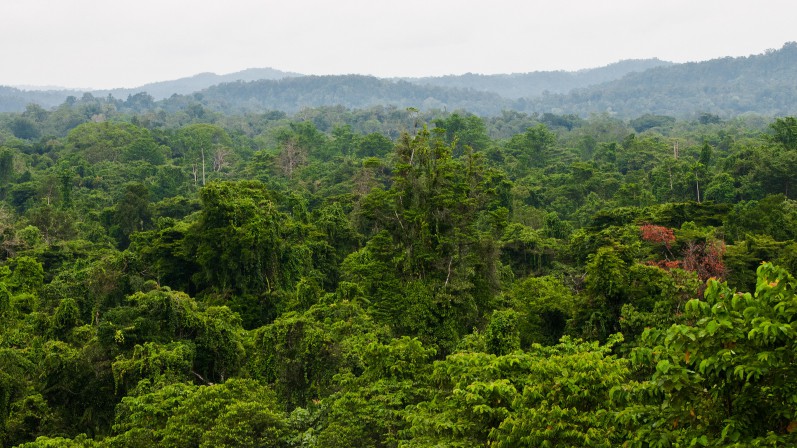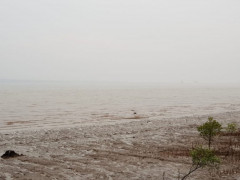Race against time
By Hairul SobriBetween Prayers, Indigenous Land, and Land Swaps in Papua

The Mpur-Kebar tribe in Tambrauw, West Papua has reached a dead end in the fight for their indigenous land, which will be converted into oil palm plantations. Their living space is increasingly under threat, particularly after the government allocated some forest areas in Papua for a land swap policy with protected peatland areas.
In the middle of an airy valley under the shining sun, no less than 15 people sat together in a circle. Faint sounds slowly broke the silence. Sakeus Manim, a religious leader of the Mpur-Kebar tribe, was leading the afternoon prayer on Friday, 27 July 2018.
“God, we have tried to meet with all parties, yet the forest will still be cleared. So let God be the one who litigates. Because the people of the world whom we met, no longer heed our voices,” said Sakeus.
Sakeus’ prayers reveal the anxiety of the six Mpur-Kebar clans in the Tambrauw regency of West Papua, because their indigenous land was allegedly seized by PT Bintuni Agro Prima Perkasa (BAPP), a player in the plantation sector. Representatives of the Mpur-Kebar tribe have brought this issue to many parties, including the governor of West Papua, the district military commander, the Papua People's Assembly, and the Special Autonomy Coalition in the West Papua Parliament. Still, nothing has been done.
Tambrauw is a new 1.1 million-hectare regency created in 2008. According to data from the Tambrauw District Forestry Service, forest areas cover 593,475 hectares of this district. Of these, 242,363 hectares, or 40 percent, are protected forests, while 215,594 hectares, or 36 percent, are natural sanctuary (perlindungan dan pelestarian alam, PPA) forests.
If this indigenous land is encroached, the situation in Tambrauw raises concerns about the protection of forest areas in Papua, especially considering a recent Anti-Forest-Mafia Coalition study, which stated that a number of forest areas in Papua and West Papua were allocated for corporate land swaps.
The land swap policy is a government effort to offer companies land outside of protected areas to incentivize them not to convert protected peatlands. The total area allocated for this land swap program is 921,230 hectares. According to the Anti-Forest-Mafia Coalition report, 65,758 hectares of natural forest in Papua province, concentrated in the relatively flat and dry southern area, has been allocated for the land swap program. Meanwhile in West Papua province, 3,565 hectares of the total 4,890 of natural forest was allocated for the land swap program. With so much Papuan land designated for businesses, the Anti-Forest-Mafia Coalition suggests that the government still sees Papua as an area to exploit.
The land swap program could actually be an effort to protect peatland areas. However, if the allocation of replacement land is not given adequate consideration, it will only exacerbate deforestation. The Anti-Forest-Mafia Coalition recommends improvements to this policy, among others, by proposing that land swaps are based on a company’s total planted area, rather than their full permitted area. In addition, replacement lands should be in unutilized mineral soil areas, not natural forests or indigenous cultural lands.
In line with the above criteria, there are some additional things to correct and consider. First, criteria and procedures for determining replacement areas in the land swap scheme should be clarified. The basis for the current implementation of the scheme – Ministry of the Environment and Forestry Regulation No. 40/2017 – does not provide criteria for appropriate area sizes and zoning designations or specify a mechanism for review of land swap areas.
Second, environmental impacts must be controlled through legislation. At present, Regulation No. 40/2017 requires that social and environmental impacts be verified only by reference to Environmental Management Effort and Environmental Monitoring Effort documentation, which do not require environmental impact analysis (AMDAL). On the other hand, Article 2, Paragraph 2b of Regulation No. 21/2014 juncto Regulation No. 5/2012 stipulates that Forest Timber Product Exploitation Permits in Industrial Plantation Forest (IUPHHK-HTI) in areas larger than or equal to 5,000 hectares require an AMDAL. This disparity in requirements is confusing and undermines environmental protection in the implementation of the land swap program.
Third, transparency and community participation must be integrated in the land swap policy. Including communities in the determination and allocation of replacement lands is very important to ensure accountability and avoid the risk of other problems, such as overlapping land rights and social conflicts.



